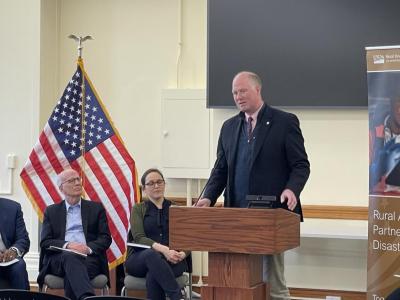
$1M Pilot Program to Provide Economic Recovery Resources, Guidance
MONTPELIER, Vt., April 25, 2024 – Sarah Waring, U.S. Department of Agriculture (USDA) State Director for Rural Development (RD), today announced $1,000,000 in technical assistance funding for Vermont communities to build financial, operational, and managerial expertise following a disaster. The Vermont League of Cities and Towns (VCLT) and the State of Vermont, through a cooperative agreement with RD, will support municipalities with direct one-on-one technical assistance in times of need, including resources and curriculum to apply for and implement available federal funds.
Made possible through RD’s Disaster Assistance Fund, this pilot program will provide critically needed skills for long-term economic recovery and resilience, and follows on the historic BidenHarris Administration legislation with the same focus: the Infrastructure Recovery Act (IRA), the Coronavirus Aid, Recovery and Economic Security Act (CARES), the American Rescue Plan Act (ARPA), and the Infrastructure Investment and Jobs Act (IIJA). On hand to celebrate the announcement were U.S. Senator Peter Welch, U.S. Representative Becca Balint, USDA Under Secretary for Rural Development Dr. Basil Gooden, Vermont State Disaster Recovery Officer Doug Farnham, VLCT Executive Director Ted Brady, and representatives of Vermont Governor Phil Scott and U.S. Senator Bernie Sanders.
"I grew up in a small town and I’ve seen the late nights and long hours that our volunteer municipal leaders put in—during a normal year,” said State Director Waring. “But when disaster strikes, many of our towns simply miss out on the opportunity to use federal funding because of the time and expertise needed. I am so proud to work for the Biden-Harris Administration, which encourages creativity to address America’s biggest challenges. Today’s announcement marks an additional opportunity to rebuild Vermont’s economic and community infrastructure with expert guidance from the ground up, and we hope it will stand as a model for other states to follow.”
“Federal programs are only useful when people have access to them,” said Senator Sanders. “Too often, they are hard to navigate – especially for our smaller communities. That is why this investment from the Biden Administration is so important: it will level the playing field and help ensure that all Vermont communities, regardless of their size, recover and become more resilient.”
“In the moments after a natural disaster, the last thing our municipalities have is the time to navigate the intricacies of the federal government,” said Senator Welch. “Vermont knows that all too well, which is why our Delegation advocated for more flood recovery funding and pushed to enhance the tools our communities have on-hand to respond to disasters. The USDA and the Biden-Harris Administration delivered for Vermont and is partnering with the State and the Vermont League of Cities and Towns on this critical resiliency program, which will help us recover and rebuild after last summer’s floods. I am thankful for State Director Sarah Waring’s leadership and her USDA RD team for their work on this new model, which will help rural communities in our state.”
“This investment will be transformational for so many Vermont communities that were devastated by last year’s floods,” said Representative Balint. “A coordinated and fully funded recovery process is critical to keeping Vermont families afloat when disaster strikes. I’m thankful for the Biden-Harris Administration’s focus on rebuilding and uplifting rural America.” “It’s impossible to measure the devastation last summer’s flooding brought to New England, and specifically Vermont, when you consider the lives that were lost and forever changed,” said Under Secretary Gooden. “For as long as it takes, the Biden-Harris Administration and USDA will make every resource available so they can continue building to a brighter future. By sharing resources and working together, USDA and our partners will ensure Vermonters can rebuild their homes, businesses and lives and are better prepared for the next storm or flood.”
“VLCT received hundreds of inquiries from selectboard members, clerks, treasurers, and other municipal officials following last summer’s flooding,” said Director Brady. “We found being prepared started with having a fundamental grasp of the best municipal finance, operations and management practices. Our municipal leaders who had good accounting practices in place, good contracting policies enacted, and a basic understanding of grants management before the storm were able to take advantage of more FEMA assistance. This grant will build these skills in more career and volunteer local leaders across Vermont, enabling them to both respond to the most recent disaster and prepare for future disasters.”
Uses of the funds may include:
- Providing one-on-one training and technical assistance to municipal officials who manage budgetary issues with FEMA applications and reimbursements
- Building out a formal education program in government finance for treasurers, administrators, managers, and legislative body members
- Building government finance expertise through networking, mentoring and formal and informal learning opportunities with partners such as Vermont Clerks and Treasurers Association, Vermont Government Finance Officers Association and more
- Developing model templates and best practices to be used in disaster response, such as tip sheets on available assistance from FEMA, USDA, etc.
- Coordinating with regional planning and development corporations and service providers through the Municipal Technical Assistance Program
USDA Rural Development provides loans and grants to help expand economic opportunities, create jobs and improve the quality of life for millions of Americans in rural areas. This assistance supports infrastructure improvements; business development; housing; community facilities such as schools, public safety and health care; and high-speed internet access in rural, tribal and high-poverty areas. Visit the Rural Data Gateway to learn how and where these investments are impacting rural America. To learn more, visit www.usda.gov. To subscribe to USDA Rural Development updates, visit the GovDelivery Subscriber Page.
###